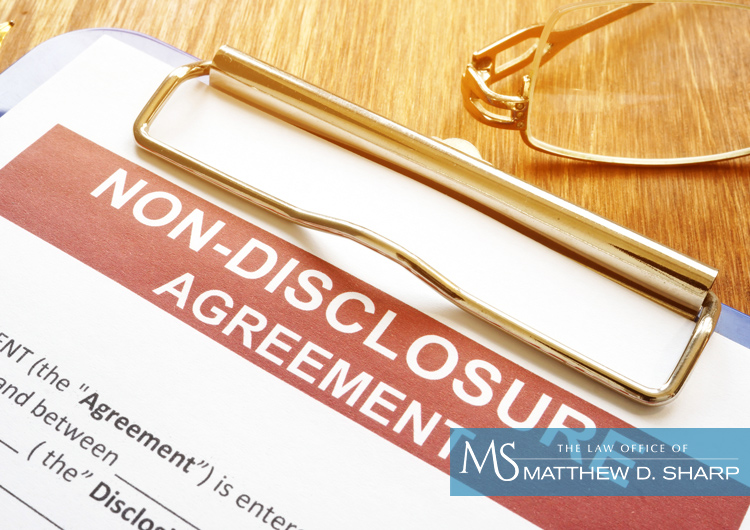Everything you need to know about filing for expungement or nondisclosure in Texas

If you were recently released from prison, were found not guilty, or had your charges dismissed, you might believe your punishment is over and you can return to a normal life. However, having a criminal record can follow you everywhere and prevent you from getting a job or obtaining a loan.
The good news is that there are some circumstances where you could legally have your criminal record cleared.
However, it’s crucial to understand that even being found not guilty or having your charges dismissed doesn’t automatically remove your criminal record from public databases, according to Texas law. Therefore, you must seek either an expungement or an order of nondisclosure.
What do background checks reveal?
Anyone can run a background check on an individual to learn more about them. Some parents do so before hiring a nanny or caregiver. Certain government agencies, employers, lenders and rental organizations may all use background checks to learn more about a person.
Unfortunately, a distant arrest or conviction can prevent individuals from obtaining quality jobs or housing.
A background check will reveal all arrests that happened in the last 7 years and every conviction. It will not reveal any arrests that happened over 7 years ago or any expunged criminal records.
Expungement vs. an order of nondisclosure
Under Texas law, the 2 ways to clear your criminal record are expungement and orders of nondisclosure. When you’re awarded either of these options, the public will no longer be able to access these records. An expungement is considered stronger than a nondisclosure order, but both options could greatly benefit you.
Here are some small (but important) differences between these 2 options:
Expungement (expunction):
- Completely erases the criminal record as if the offense never occurred.
- After expunction, the individual can legally deny the incident ever happened, and the record is not accessible to the public or most private entities.
- Typically available for arrests that did not lead to a conviction, certain juvenile offenses, and in some cases where there was a conviction followed by a pardon.
Nondisclosure (order of nondisclosure):
- Does not erase the criminal record but restricts who can access it.
- Generally, the record is hidden from public view and most private entities, like employers or landlords, but remains visible to government agencies and for certain legal proceedings.
- Usually available for individuals who completed deferred adjudication or probation for certain offenses and have met all conditions, including a waiting period.
How to Avoid a Criminal Conviction With Deferred Adjudication
Learn how deferred adjudications can give defendants a second chance when facing a conviction in Texas.
What is eligible for expunction in Texas?
In Texas, the qualifications for expunction (expungement) of criminal records vary depending on the offense and type of community supervision received.
You may be eligible for expungement if you:
- Received deferred adjudication for a Class C misdemeanor
- Were arrested but not formally charged
- Were acquitted
- Were found guilty and then pardoned
- Were found guilty and then exonerated
Additionally, there are waiting periods before you can file for expunction, depending on the offense or charge.
For offenses without charges, the minimum waiting periods before applying for expunction are as follows:
- Class C misdemeanors – 180 days
- Class A and B misdemeanors – 1 year
- Felonies – 3 years
For cases in which charges were brought, the statute of limitations must have expired for all crimes associated with the arrest (not just the charged offenses) before you can apply for expunction.
Disqualifications for an expunction in Texas
To help simplify the criteria further, in Texas, you are not eligible for expunction if any of the following are true:
- You were convicted of the offense you wish to expunge.
- There are currently pending charges against you from the arrest you seek to expunge.
- You want to expunge a crime for which you were found not guilty at trial but have past convictions for similar crimes.
- You were placed on deferred adjudication for the offense, except if it’s a Class C misdemeanor.
- You were released on conditional discharge under the Controlled Substances Act (this does not apply to charges brought after August 31, 1991).
It’s important to note that these are general guidelines, and the specifics can vary based on individual circumstances and changes in the law. For a definitive assessment of eligibility for expunction, it’s advisable to consult with a skilled expungement attorney who is well-versed in Texas law.
Do I Need an Attorney to Expunge My Criminal Record?
Learn why you might need the help of a criminal defense attorney to get your criminal record expunged.
Eligibility for automatic nondisclosure vs. petition for nondisclosure in Texas
Prior to September 15, 2015, the only way to obtain an order of nondisclosure was to file a petition. Today, however, Texas law allows for an automatic order of nondisclosure for certain offenses.
When are defendants eligible for automatic nondisclosure?
Automatic nondisclosures are typically only available for certain low-level misdemeanors in which the defendant was given and completed deferred adjudication. More serious offenses and certain misdemeanors are excluded, including those that involve:
- Sexual offenses
- Public indecency
- Kidnapping or unlawful restraint
- Family violence
Some of the factors that affect a defendant’s ability to qualify for automatic nondisclosure include the following:
- First-time offender. You must be a first-time offender, meaning you have not been convicted or placed on deferred adjudication for any offense other than fine-only traffic violations.
- Completion of deferred adjudication. You must have successfully completed deferred adjudication and received an order of discharge and dismissal.
- Waiting period. A waiting period of at least 180 days from the start of the deferred adjudication must have passed.
Additionally, the defendant is required to pay a fee of $280 (the court’s regular civil filing fee plus $28) to a clerk, and the court must make a finding that the nondisclosure is in the best interest of justice.
When can defendants petition for nondisclosure?
If your offense doesn’t qualify for automatic nondisclosure, you may still be eligible to petition for nondisclosure for a broader range of offenses, including some felonies and misdemeanors that are not eligible for automatic nondisclosure.
Below are some factors that affect a defendant’s ability to petition for nondisclosure:
- Completion of terms. You must have successfully completed the terms of your deferred adjudication or, in some cases, probation.
- Waiting period. There is usually a longer waiting period before you can file a petition for nondisclosure, which varies depending on the nature of the offense.
- No disqualifying offenses. You must not have a criminal history involving certain disqualifying offenses, especially serious or violent crimes.
- Best interest of justice. For petitioned nondisclosures, you might need to demonstrate that issuing the nondisclosure is in the best interest of justice.
Because the laws around nondisclosure are complicated, it’s advisable to consult with a legal professional to determine your eligibility and the best course of action based on your specific circumstances and the most current Texas laws.
Juvenile nondisclosure
For offenses involving minors, the state offers certain automatic and petitioned record restrictions.
Texas may automatically restrict record access for individuals who turn 17, who were not violent or serial offenders, and who were not tried as adults. The state may, however, remove all record restrictions if an individual commits a serious crime as an adult.
Juveniles and their representatives may also ask the state to permanently seal criminal records. Texas may grant permanent sealing for misdemeanor cases if a minor was not convicted of other offenses and does not face additional pending charges.
For felony offenses, a juvenile offender may qualify for record sealing if they are 19 or older, were not tried as an adult, and did not obtain a conviction for an additional felony after turning 17.
Guide to the Juvenile Criminal Justice System in Texas
Learn how teenage criminals are treated under Texas law.
The process of getting your criminal record cleared
Texas expungement and nondisclosure laws are very complicated, and you will likely need the help of a knowledgeable defense lawyer. Once you have met all the requirements for expungement, you must file a motion at the same court where your conviction occurred or at the court in the same county where your arrest occurred.
After your motion has been granted, the judge will issue an expungement or an order of nondisclosure.
FAQs
How fast can you get something expunged in Texas?
The timeline for getting something expunged in Texas can vary significantly depending on various factors, including the complexity of the case, the specific charges involved, the court’s schedule, and administrative processing times.
Before filing for expunction, you need to ensure that you meet the eligibility criteria. This includes waiting for any applicable waiting periods to pass (180 days for Class C misdemeanors, 1 year for Class A and B misdemeanors, and 3 years for felonies).
Once you’re eligible, you must file a Petition for Expunction with the appropriate court and attend an expungement hearing.
In general, the process can take anywhere from a few months to over a year, depending on the specifics of your case and the efficiency of the court and other agencies involved. Consulting with a legal professional can provide a more accurate timeline based on your specific circumstances and the current workload of the courts in your area.
Can I get a DUI expunged in Texas?
A DUI (driving under the influence) can have long-lasting repercussions, so it’s common for those convicted of the crime to want to know if and how to get a DUI expunged in Texas. Unfortunately, in most cases, you would only be eligible for a DUI expunction if the charges against you were dismissed or you were acquitted.
However, if it’s your first offense, you may qualify to petition for a DWI nondisclosure, depending on the specific details of your case. An experienced criminal defense attorney can review your conviction and let you know if nondisclosure is possible in your case.
Can I own a gun after felony expungement in Texas?
In Texas, if a felony is successfully expunged from your record, it generally restores your rights, including your right to own a firearm.
Expungement effectively means that, legally, the offense is deemed not to have occurred, and you can legally deny its occurrence. Therefore, in the eyes of the law, you would no longer be considered a felon once the expungement is complete.
It’s important to remember that expungement eligibility in Texas is quite limited, especially for felonies. Many felonies cannot be expunged, and successful expungement is typically only possible in cases where there was no conviction (such as dismissals or acquittals).
If expungement is not possible, other legal measures, like a pardon or a restoration of rights, might be necessary to regain the right to own a firearm. These processes are typically more complex and may require significant legal assistance.
Looking to get your criminal record cleared in Texas? Houston criminal defense attorney Matthew D. Sharp can help.
Given how complex the entire process is and how difficult it may be for you to even know if you qualify for expunction or nondisclosure, begin by speaking with an experienced and affordable criminal defense attorney near you.
At The Law Office of Matthew D. Sharp, Houston criminal defense attorney Matt Sharp can manage your entire case from beginning to end and represent you in court proceedings. He can also inform you about the cost of expunging a criminal record in Texas, including all associated filing fees.






